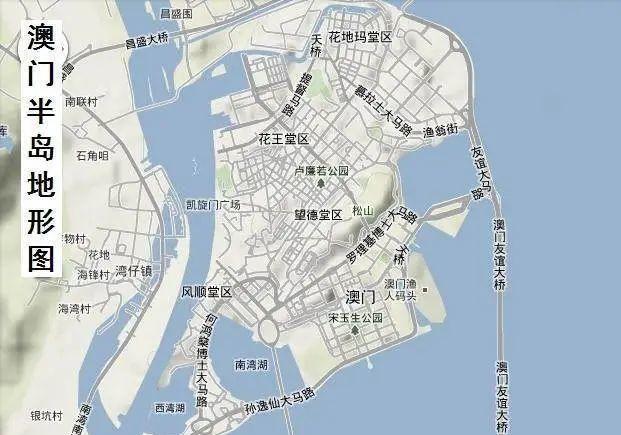
Map of Macau
December 20 was "Macao's Return of the Motherland", or "Macao's Day of Return to The Motherland"; on December 20, 1999, the Chinese government resumed the exercise of sovereignty over Macao.
Macau used to be a small fishing village, its original name was "Hao Jing O". At that time, the vicinity was rich in oysters (i.e., oysters). According to the "Chronicle of Macao" published during the Qianlong period of the Qing Dynasty, "The name of Haojing is written in the History of Ming. Five or six miles from east to west, half from north to south, there are two bays in the north and south, and you can moor boats. Or the north and south two bays, the regular circle is like a mirror, so it is known as a mirror. ”
The reason why oysters have become "Hao" is because the word "Hao" is more elegant. And Australia means a place where the shore bends to park the boat, that is, the berth.
The name Macau is derived from Mazu. In the thirty-second year of Ming Jiajing (1553), the Portuguese obtained the right of residence in Macau from the local government of Guangdong in the Ming Dynasty, becoming the first Europeans to enter China.
At that time, the Portuguese landed near Mazukaku (Ma Ge Temple) and asked the locals about the place name here. Because it is next to the A-Ma Temple, the locals reply "A-Ma Pavilion". Subsequently, Macau was known to the Portuguese as Macau (the Portuguese transliteration of the word "A-Ma"). Today, the Name of Macau is spelled Macao, which is where it originated.
After the Opium War, the Governor of Macau, Yamalius, no longer paid land rent to China
The Portuguese means of invading and occupying Macao in that year were very absurd. In 1553, the Portuguese colonists used bribes and deception to falsely claim that merchant ships encountered a storm and wanted to "dry goods" in Macau, and forcibly occupied Macao in the name of borrowing.
Guo Fei of the Ming Dynasty wrote in the "Waizhi Macao" article of volume 69 of the "Guangdong Tongzhi": In the thirty-second year of Jiajing, the mirror of The Yi Yi tended to the mirror, and the Boat of Words touched the cracks in the wind and waves, and the water was wet, and the tribute was willing to temporarily borrow the land to dry. Wang Baixing, the deputy envoy of Haidao, bribed Xu Zhi, and at that time only had dozens of tents, and those who made profits from industry and commerce gradually transported bricks, tiles, wood and stones as houses, if they were settled. Since the Ao are abolished, HaoJing is the only one.
Notice here a name for Deputy Admiral Wang Bai. On 15 January 1556, the Portuguese captain Leonel de Sousa, in a letter to Prince D. Luis, brother of Loao III, told him about his dealings with Wang Bai:
"I took a merchant ship to China in 1552. There was not much progress in business, as the Portuguese were placed among the Flang machines and were forbidden to use Chinese ports. I ordered the Portuguese on the seas of China not to land, nor to do anything against Chinese. Then peace negotiations, the Portuguese promised to pay various tariffs, all the Portuguese agreed to such an agreement ...
"Since portuguese were not allowed to reside in China initially, such an agreement was not possible earlier. In order to reach such an agreement, it was decided that the Portuguese were not the Flangers whom the Manchus used to call us. "
"The peace agreement and the payment of various customs duties were decided by order of the deputy envoy of Guangzhou Chenghai."
Flang machine cannon
It can be seen from this that Guo Fei's statement in the Guangdong Tongzhi that Wang Bai "bribed Xu Zhi" can be confirmed by Sosa's letter. Wang Bai clearly knew that the Portuguese were Flang machines, and signed an agreement with them to allow trade, which was a traitorous act.
Flang machine. During the Ming Dynasty in China, it was commonly known as Flang Machine for Portugal and Spain. In 1511, the Portuguese navy occupied Malacca (the "Manchuria" in the preceding article), which had been paying tribute to the Ming Dynasty since the beginning of the 15th century, and had been plotting to colonize and plunder our country, and had many military conflicts with the Ming government.
After the occupation of Macau, Portugal initially paid 1,000 taels of silver as a rent a year, which was later reduced to 500 taels; after the Opium War, it was no longer paid. Not only that, but Portugal is more self-respecting, and once the demands are not met, they will use force to force them.
After the grape people occupied Macau, they also had a great influence on Ryukyu (now "Okinawa"), a vassal state of China at that time. Previously, Ryukyu's trade with the South China Sea was very frequent, and since then, Ryukyu's trade in the South China Sea has been devastated, its national strength has declined, and it has finally been occupied by Japan.